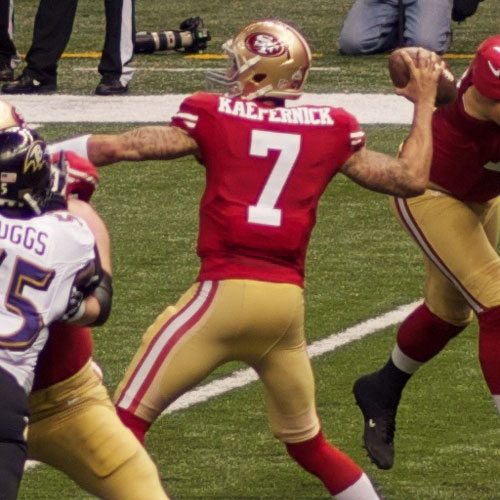
August 23, 2017; Bleacher Report
Last summer, Colin Kaepernick quietly sat during the national anthem in a preseason NFL game. The purpose of his protest was to bring attention to the mistreatment of African Americans and people of color, specifically regarding police brutality. The public outcry started almost immediately, and it has yet to end, despite numerous other players in the NFL joining in similar peaceful protests.
At the end of the 2016 NFL season, Kaepernick opted out of his contract to become a free agent. He remains a free agent, despite being as good or better than a number of current starting quarterbacks and backup quarterbacks. He also has a track record of success, despite slumping in recent years. This has led some to wonder why this may be, positing that it has little to do on-field performance.
When he began his protest, Kaepernick sat during the anthem. Amid calls that his sitting was disrespectful to the armed forces, he decided to kneel, believing it would be more respectful. When critics claimed he was doing it for publicity and that he should put his money where his mouth is, he did, pledging to donate $1 million to various charities that would aid underprivileged groups. To date, he has donated $800,000 to charities of various causes. Fittingly, among the most recent is the Dreamville Foundation established in 2012 by rapper J. Cole. The foundation seeks to fund education for at-risk youth. That still hasn’t been enough for many, and his advocacy might still be hurting him in the eyes of his critics. Kaepernick was out in front of this movement in the NFL and now, he is paying for it.
Sign up for our free newsletters
Subscribe to NPQ's newsletters to have our top stories delivered directly to your inbox.
By signing up, you agree to our privacy policy and terms of use, and to receive messages from NPQ and our partners.
What Kaepernick is doing is admirable. He is using his celebrity to advocate for a cause he believes in. He has managed to start a dialogue about the treatment of people of color and particularly Black people in America—although too often the argument drifts to how he protests, not why.
Celebrities using their platform to have a voice in social issues has a long and storied history in sports, particularly among Black athletes. It’s always a risk, but it’s often powerful for the athlete. Now, however, there appear to be more instances of the strategy. Last year, Megan Rapinoe knelt during the national anthem in solidarity with Kaepernick. And, just this week, Buffalo Bills receiver Anquan Boldin saw this moment in a way that led him to leave the NFL only weeks after signing a $1.75 million contract.
As for Colin Kaepernick, he has been successful in starting a movement in the NFL. He has the support of a number of key groups. Hopefully, a team with a need at quarterback makes the right call and signs Kaepernick.—Sean Watterson













